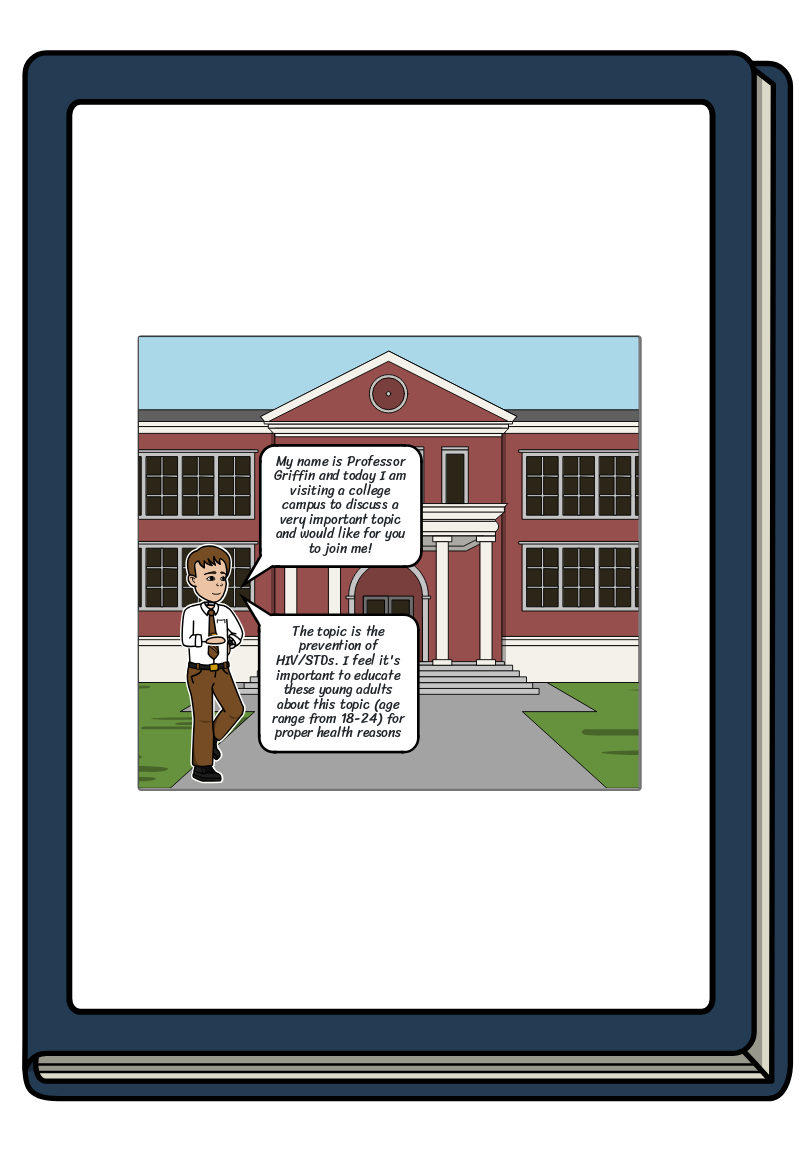Untitled Storyboard

Storyboard Text
- Slide: 1
- My name is Professor Griffin and today I am visiting a college campus to discuss a very important topic and would like for you to join me!
- The topic is the prevention of HIV/STDs. I feel it's important to educate these young adults about this topic (age range from 18-24) for proper health reasons
- Slide: 2
- Hello students, today I would like to talk to everyone about preventing HIV/STDs and the importance behind doing so for your own health
- Slide: 3
- Hi Professor Griffin. We are ready to learn
- Slide: 4
- Preventing HIV and STDs is important because once contracted, it could lead to many health complications and possibly death
- HIV is an immunodeficiency virus that compromises the immune system permanently.
- Slide: 5
- STDs are known as an infection that is transmitted through sexual contact and caused by bacteria virus that make you more prone to HIV if not medically treated
- Slide: 6
- A key term according to HIV.org states, "People who acquired HIV through heterosexual contact accounted for 22% (7,000) of the 31,800 estimated new HIV infections in 2022
- Another important concept HIV.org mentions is "HIV continues to have a disproportionate impact on certain populations, particularly racial and ethnic minorities and gay/bisexual men
- Slide: 7
- No matter your race, gender, ethnicity, or age, everyone is vulnerable to HIV and STDs, which makes it even more important to know the ways to prevent it
- Let's go over a few important ways to help you prevent HIV and STDs
- Slide: 8
- An important concept to think about when preventing HIV and STDs is your long term health. In order to achieve this, the use of latex condoms would help with protected sex, reducing the risk dramtically.
- Another suggestion would be limiting sexual partners, as this can also reduce your risk of unwanted STDs and HIV
- Slide: 9
- As there is no current vaccine to prevent HIV, vaccinations like Hepatitis B and HPV are proven to medically be safe and effective against unwanted STDs
- Slide: 10
- Keeping in mind these statistics, tips, and facts about preventing HIV and STDs will help you maintain a healthy sexual life and keep you and your partners safe
- To conclude, I would like to take one question from someone in the class please about the topic we discussed today
- Slide: 11
- If you are sexually active with more than 1 partner, how often should you get tested?
- Slide: 12
- Great question! It's important to get tested regularly if you are sexually active. The CDC suggests getting tested every 3-6 months. You can always look up the official CDC website for any additional questions
- Here are some additional resources and websites to learn more about preventing HIV/STDs:CDC.govHIV.orgWHO.int
- Slide: 13
- That's great! Thank you again for the resources!
- Slide: 14
- This discussion was very educational and provided us with many great facts and pieces of advice when preventing HIV and STDs
Over 30 Million Storyboards Created
No Downloads, No Credit Card, and No Login Needed to Try!
